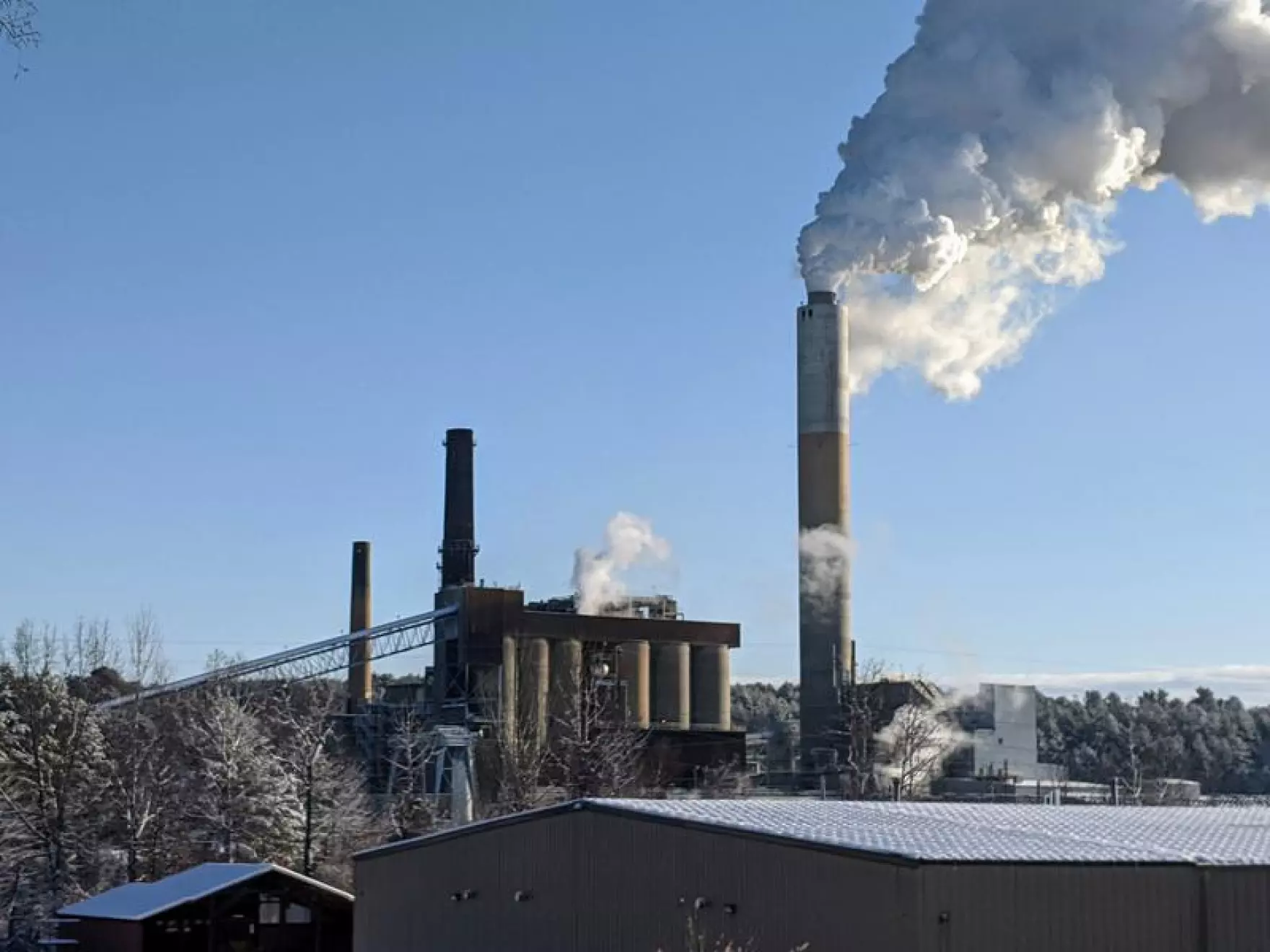The EPA just proposed new rules for power plants. How would they affect New England?

The Merrimack Generating Station in Bow, New Hampshire (Annie Ropeik / NHPR)
The U.S. The Environmental Protection Agency proposed new rules for power plants Thursday that would set emissions limits for carbon dioxide from power plants. It’s part of an effort to cut down on the greenhouse gases that further climate change, which are already making New Hampshire hotter and wetter.
In New England, the proposal could mean more momentum to clean up the electricity sector, as states in the region work to electrify. The Merrimack Generating Station in Bow – the region’s last facility burning coal – could face additional pressure to shut down if the proposed rules are enacted.
Five of the six New England states, with the exception of New Hampshire, have climate plans that are focused on shifting transportation and heating onto electricity and off of gas and oil, said Greg Cunningham, vice president of clean energy and climate change at the Conservation Law Foundation.
“That electrification transition is heavily dependent on having clean forms of electricity,” Cunningham said. “And what this rule has the potential to do is substantially reduce carbon emissions from the electric sector.”
The proposal comes after a U.S. Supreme Court ruling limited federal regulators’ ability to force power generators to move to new, cleaner sources of energy. The new proposal from the Biden administration instead relies on power plants implementing technologies like carbon capture and storage or switching their fuel sources to hydrogen.
Rebecca Beaulieu, a spokesperson for the advocacy group 350 New Hampshire, said she has concerns about carbon capture technology being implemented as a way to comply with emissions reductions.
“The best way that we can reduce our carbon emissions is by shutting down the source of them in the first place, and not trying to put a band-aid over it,” she said. “And carbon capture is that band-aid.”
Beaulieu also said she hopes the proposed rules would be implemented with environmental justice in mind.
“Frontline communities, like the one in Bow, who have the coal plant, have to be talked to when these things are being implemented,” she said.
The EPA says their proposed emissions guidelines would require states to “undertake meaningful engagement with affected stakeholders,” especially focused on communities most vulnerable to emissions from generators.
Potential impact on Merrimack Station
Under the EPA’s proposal, coal-fired plants that plan to run in 2040 would need to install carbon capture and storage systems. Plants that plan to retire before then have additional options, like starting to use some gas in addition to coal for their operations. For plants that retire by 2032, or plants that retire by 2035 and only run at 20% of their capacity, only routine maintenance would be required.
The Merrimack Generating Station in Bow already operates at low capacity – only turning on when electricity demand is high, like on very hot or very cold days. But Dennis Wamsted, an analyst with the Institute for Energy Economics and Financial Analysis, said the plant would likely need to shut down by the 2035 deadline.
“There is no way you could make an economic case for continuing to operate that plant if it had to go to the expense of installing carbon capture and storage equipment and also figuring out a way to dispose of the carbon captured,” he said.
The coal plant was already dealt a blow this spring when it failed to get funding from an annual program that determines which power generators will be on this grid in three years’ time.
Plants that run on gas also face changes if the proposals are enacted. The rules would be most strict for large gas facilities that run more often.
“It does create real operational challenges for some of the existing power generators that are still needed for reliability,” said New England Power Generators Association President Dan Dolan.
Carbon capture and storage isn’t currently being used in any commercial power plants in the United States. And in New England, Dolan said it would be particularly difficult to implement. Carbon needs to be stored in the ground, and there aren’t many options.
“New Hampshire is not the Granite State for nothing,” Dolan said. “And we see that same level of geology across New England. So the storage capability of injecting carbon dioxide into caverns and decommissioned wells is simply not a meaningful opportunity in New England.”
Cunningham, with the Conservation Law Foundation, said facilities could pipe their carbon out of the region, but those plans could be expensive and face regulatory hurdles.
Another way for gas plants to comply with the proposed rules would be for them to start replacing gas with hydrogen, blending the fuels. Dolan expressed misgivings about that solution, too.
“That today is not an industry that we see really at scale,” he said. “It might be over the next 10-plus years that these rules contemplate, but at least today it’s hard to account for: What are going to be the costs of that? What are the transportation issues? How is the hydrogen even going to be produced?”
Cunningham said the difficulties with those technologies could lead companies to stop burning fossil fuels entirely.
“If they want to stay in the market, I think there is the very real possibility that they choose alternative forms of generation,” he said.
Though the proposal wouldn’t require substantial action until the end of the decade, Cunningham said it could have a more immediate impact — in combination with the Inflation Reduction Act, which also encourages the development of clean energy sources.
The EPA will take comments on their proposal for 60 days after it is published in the Federal Register. Instructions for submitting comments can be found at https://www.regulations.gov/.
